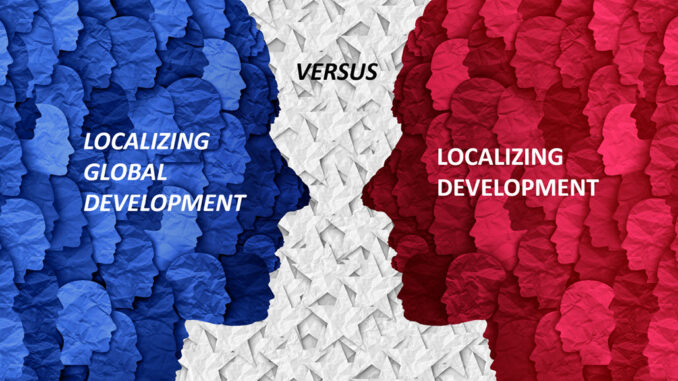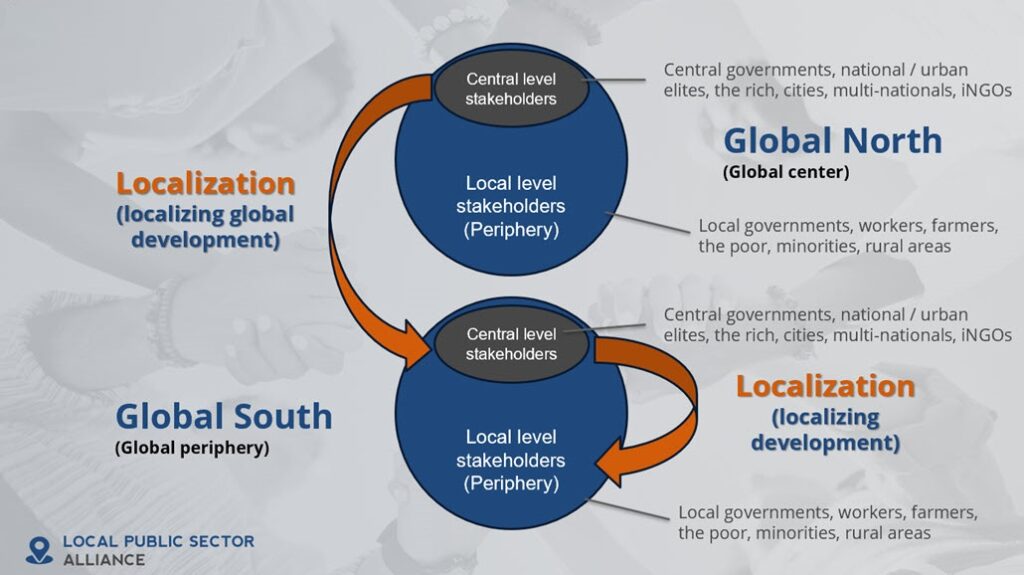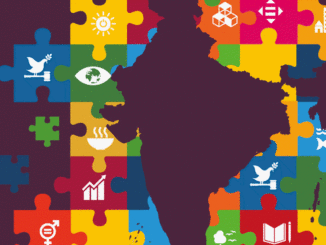
The term localization has become increasingly popular in parts of the global development community in recent years. This should be good news to the members of the Local Public Sector Alliance (LPSA), a global professional network of advocates for effective and inclusive decentralization and localization.
Unfortunately, the terms ‘localization’ is increasingly used in two different ways, which is causing some confusion in policy debates around localization. Resolving this confusion will most likely benefit both conversations.
The ‘original’ application of the term ‘localization’
In 1999, the World Bank proclaimed that, upon` entering the 21st century, “[t]wo main forces will be shaping the world in which development policy will be defined and implemented: globalization (the continuing integration of the countries of the world) and localization (the desire for self-determination and the devolution of power).”
Although exact definitions vary, the term ‘localization’ in this context refers to country-level processes of central-level actors engaging with local governments and other subnational stakeholders, for instance, through the decentralization of political power to subnational levels of government; through urbanization; or by ensuring that the localized provision of essential public services reaches the cities, towns, and rural communities where people live and work.
In the period from 2000 through 2015, the prevailing understanding was that localization dealt with bring the public sector closer to the people, whether the discussion dealt with ‘localizing the MDGs‘, participatory local development, or localizing public services, such as health and education. Since 2015, the concept of localization has been closely associated with the achievement of the 2030 Agenda for Sustainable Development.
Localizing development, then, is aimed at changing the public sector systems that currently fail to be as inclusive, equitable or adaptive as they need to be in order to achieve development outcomes at the grassroots level.
Rather than using the terms decentralization (which until the early 2000s was almost exclusively associated with political, administrative, or fiscal decentralization reforms), the term localization is used more broadly to refer to the engagement by the central government of local governments and other subnational actors in pursuing inclusive governance and sustainable development. For instance, LPSA defines the local public sector as “the part of the public sector that interacts with citizens, civil society and the private sector in a localized manner. As such, it is where residents and businesses receive services from the public sector and where citizens regularly interact with public servants and government officials…. The most common way for the public sector to interact with people at the local level is through elected local governments.”
Localizing global development – a different application of the same term
In the last few years, the term ‘localization’ (or localizing global development or ‘locally-led development’) is increasingly being applied by some to refer to a phenomenon that has less to do with the local public sector, but instead, relates to efforts to shift power from actors in the Global North to actors in the Global South.
One of the global organizations that frequently uses the term localization in this manner is the U.S. Agency for International Development (USAID). For instance, USAID’s new localization strategy defines localization as “the set of internal reforms, actions, and behavior changes that we are undertaking to ensure our work puts local actors in the lead, strengthens local systems, and is responsive to local communities”. A more careful reading of this strategy suggests that the term ‘local’ does not refer to local government institutions or other subnational actors. Instead, it appears that USAID’s aims is actually to pursue a set of reforms, actions, and behavior changes to ensure USAID’s work puts national actors in partner countries in the lead and strengthens national systems, in a way that is responsive to the needs of local communities.
One thing that is hard to disagree with is the desire of global development partners, foundations, and international NGOs to de-colonize development assistance and ‘shift the power’ away from the Global North. In the case of USAID, this requires transforming the agency’s traditional approach to global development, which has placed a large share (if not the majority) of its development portfolio in the hands of a relatively limited number of development organizations within the Washington beltway. Almost twenty years after the Millennium Challenge Corporation (MCC) was established to support country-owned and country-led development, and fifteen years after the Paris Declaration and the Accra Agenda for Action, it is appropriate for the world’s largest bilateral development agency to pursue an approach that ensures that—whenever possible—solutions to development problems are country-led, country-implemented, and solved as close to the people as efficiently possible.
Although the debate of localizing global development hasn’t reached its zenith yet, it appears that the localization of global development assistance largely targets an intermediate outcome: assuring that development interventions are increasingly designed and implemented within the cooperating country, closer to the intended beneficiaries of the program. While this means that people previously not in the room are more often in the room, it is unclear to what extent doing so actually shift the power, and to whom.
Can ‘global’ localization be achieved without country-level localization?
Efforts to ‘localize’ global development assistance are at greatest risk of failing exactly where the chosen terminology obfuscates at which level inclusive governance and sustainable development really take place. While efforts to make development assistance more effective and inclusive requires local voices to lead the way, but which ‘local’ voices does this refer to?
- If (global) localization refers exclusive to a transfer of power and resources from the Global North to the Global South, wouldn’t the most direct of way of ‘shifting the power’ involve providing development resources to the democratically elected central governments in the Global South, for instance through general budget support? It would then be up to the elected representatives of the people in the global South to prioritize the allocation of these resources. While development partners, foundations, and international NGOs often work with central governments, many development partners, foundations, and international NGOs opt not to work through central governments. Presumably, this is due to the realization that the ambitions of central governments are not always perfectly aligned with the ambitions of Global North funders; due to concerns about the efficiency of central-level bureaucratic institutions; or due to concerns about their accountability.
- Instead, international development organizations often work through international NGOs or national level civil society organizations. But is the Harvard-educated Chief of Party at an internationally-funded civil society organization truly a “local” actor, or is (s)he part of his or her respective national elite? And who are NGOs and other civil society actors ultimately accountable to, other than to the funder (whether in the Global North or in the Global South) who provides the resources? If NGOs are mainly accountable to their funders rather than to their respective communities, has the power really shifted?
- Or, as a third option, does localization take place when global development actors funnel their resources to the truly local stakeholders in cities and towns across a country, who are elected by their neighbors to manage the affairs of their local communities? Is this what we mean when saying that localization should put resources in the hands of the people who are closest to the problems?
Setting aside the confusion surrounding the term itself, one major concern is that efforts to shift the power within the global development community is that such reforms risk being more about form than function, which could result in lack of adequate results-orientation in development interventions. Decolonization efforts would be heading in the wrong direction if efforts to ‘shift the power’ would result in development assistance being put behind ineffective country-led development policies—simply because they are ‘locally-grown’—while failing to benefit from comparative insights contributed by supra-national centers of knowledge and experience.
In addition, sincere efforts to de-colonize development assistance may run the risk of being circumvented or undermined by for-profit and non-profit development actors from the Global North by simply re-registering or incorporating in the Global South.
Localization of global development: an old idea in a new jacket?
The question of ‘local’ voice, local participation, and local representation in development assistance requires us to confront a more fundamental truth about the nature of development. Even though global organizations and central government actors can be funders, champions, and catalysts for development, real development doesn’t happen within the walls of global development agencies in Washington, New York, London, or Paris, nor is development achieved within the halls of central government ministries and agencies. Instead, public services are delivered –and inclusive, sustainable development is actually achieved—in the cities, towns and rural communities where people live and work. It also raises the question whether local government in the Global South are adequately empowered and downwardly accountable to engage in decentralized cooperation, or whether this requires creating an enabling environment for decentralized cooperation worldwide.
The idea that inclusive governance and responsive and sustainable development originates at the local (grassroots) level is nothing new and long precedes the more recent desire to decolonize development assistance. In fact, these issues were quite relevant when the world was actually undergoing the original decolonization process.
Development theories articulated in the years after WWII recognized that transferring political power from the Global North (the global ‘center’) to the Global South (the global ‘periphery’) would achieve little meaningful empowerment or development if national development efforts in the Global South would be captured by central governments led by self-interested elites in the newly independent republics.
A variation of this theme was articulated clearly and strongly during the (original) process of decolonization itself. Assessing the state of British and formerly British territories around the world in 1961, Lady Ursula Hicks remarked that:
When a country becomes ‘self-governing’, there is always the danger that it will merely be exchanging one set of masters for another. Especially in the day of [central] economic planning, it is important that all initiative should not come from the central government. Local institutions, controlled by local communities, must have a place. [Emphasis added]
Ursula Hicks, Development from Below, 1961
Where global localization and country-level localization meet: the challenge in localizing development and decentralized development cooperation
To the extent that development progress is limited by an inefficient and unresponsive public sector, it could be argued that the real –but often overlooked– challenge in ‘localizing global development’ is to make sure that some of the decision-making power, service delivery responsibility, and resources flows from the Global North to the Global South, but in turn, flows down within the public sector, as close to the grassroots level as efficiently possible, where public services are actually delivered and where development takes place.
A key underlying principle, known as the subsidiarity principle, has become widely accepted with the global decentralization and localization Community of Practice: this principle suggests that public services and development challenges should be addressed at the lowest level of public organization that can efficiently provide a service or resolve a challenge. In fact, the concept was so widely accepted in Europe that the principle was incorporated into the Treaty establishing the European Community and the European Charter of Local Self Government.
Unfortunately, the basic premise that development problems should be addressed at the lowest level of the public sector that is capable of resolving them efficiently is often ignored by central governments and global development organizations alike. The same political economy forces that often lead central government ministries to slow-walk or oppose decentralization and localization reforms often also discourage—either directly or indirectly–international development partners from pursuing development interventions in a decentralized manner.
In the absence of effective decentralization or localization—of government funds and global donor resources alike—financial and human resources are likely to get stuck at the central level, where these resources may be used to fund bloated bureaucracies, posh project offices, or inefficient development programs that don’t have a meaningful impact on the daily lives of people.
For the majority of countries, and for the majority of development actors, then, the real question is not whether to ‘decentralize or localize’ or not, but to find ways to improve the capacity and co-ordination among stakeholders, at all levels of government, as well as within the global development community, to increase the inclusiveness, responsiveness, efficiency, equity and sustainability not only of the public sector, but also of the development interventions that aim to support development.
This article was posted November 3,2023. Jamie Boex is the Executive Director of the Local Public Sector Alliance (LPSA). The author would like to thank Chas Cadwell and Serdar Yilmaz for constructive feedback on an earlier draft.




